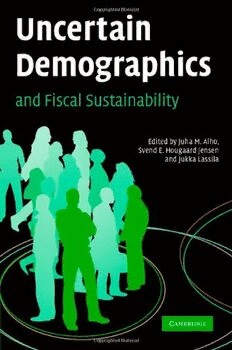
Uncertain Demographics and Fiscal Sustainability PDF
Preview Uncertain Demographics and Fiscal Sustainability
This page intentionally left blank Uncertain Demographics and Fiscal Sustainability Thereiswidespreadacceptancethatmuchofthedevelopedworldfaces apotentialpensionsandwelfarecrisisasaresultofdecliningbirthrates and an ageing population. However, there is considerable uncertainty aboutthespecificsofdemographicforecastingandthishassignificant implicationsforpublicfinances.UncertainDemographicsandFiscalSus- tainability addresses the economic consequences of uncertainty and, withparticularreferencetoEuropeaneconomies,explorestheimpactof demographicrisksonpublicfinances,includingpensionsystems,health care and old-age care expenditures. Covering a spectrum of theoreti- calandempiricalapproaches,differenttypesofcomputationalmodels are used to demonstrate not only the magnitudes of the uncertainties involvedbutalsohowthesecanbeaddressedthroughpolicyinitiatives. The book is divided into four parts covering demographic, measure- ment, policy and methodological issues. Each part is followed by a discussion essay that draws out key elements and identifies common themes. . isProfessorofStatisticsattheUniversityofJoensuu, Finland.Heistheauthor(withBruceD.Spencer)ofStatisticalDemogra- phyandForecasting(2005)andaformerpresidentoftheFinnishSociety ofBiostatistics. . is Managing Director of the Copenhagen-based Centre for Economic and Business Research (CEBR),ProfessorofEconomicsatCopenhagenBusinessSchooland amemberoftheDanishCouncilforResearchPolicy. is Research Director at the Research Institute of the Finnish Economy (ETLA) in Helsinki. He has co-ordinated several international research projects concerning population ageing and was scientific co-ordinator in the EU Fifth Framework research project ‘Demographic Uncertainty and the Sustainability of Social WelfareSystems’. Uncertain Demographics and Fiscal Sustainability Editedby Juha M. Alho, Svend E. Hougaard Jensen and Jukka Lassila CAMBRIDGEUNIVERSITYPRESS Cambridge, New York, Melbourne, Madrid, Cape Town, Singapore, São Paulo Cambridge University Press The Edinburgh Building, Cambridge CB28RU, UK Published in the United States of America by Cambridge University Press, New York www.cambridge.org Information on this title: www.cambridge.org/9780521877404 © Cambridge University Press 2008 This publication is in copyright. Subject to statutory exception and to the provision of relevant collective licensing agreements, no reproduction of any part may take place without the written permission of Cambridge University Press. First published in print format 2008 ISBN-13 978-0-511-38811-8 eBook (NetLibrary) ISBN-13 978-0-521-87740-4 hardback Cambridge University Press has no responsibility for the persistence or accuracy of urls for external or third-party internet websites referred to in this publication, and does not guarantee that any content on such websites is, or will remain, accurate or appropriate. Contents Listoffigures page vii Listoftables xi Listofcontributors xiv Preface xvi 1 Introduction 1 . , . PartI Uncertaindemographics 2 Changingviewsoffuturedemographictrends 11 , . 3 Empiricallybasedspecificationofforecastuncertainty 34 . , Comment:TheUPEforecasts:strengths,innovations, developments 55 PartII Measuringsustainabilityinastochastic environment 4 Fiscalimplicationsofdemographicuncertainty: comparisonsacrosstheEuropeanUnion 65 5 Demographicuncertaintyandpensionprojections 82 v vi Contents 6 Demographicuncertaintyandhealthcareexpenditure 94 Comment:Assessingtheuncertaintyinlong-termfiscal projections 109 PartIII Enhancingsustainability 7 EvaluatingpensionreformsintheGermancontext 117 8 Longevityadjustmentofpensionbenefits 137 9 Ageing,demographicuncertaintyandoptimal fiscalpolicy 161 , , Comment:Computableequilibriummodelsinpolicy analysis:futuredirections 184 . PartIV Extensions 10 Macro-economicconsequencesofdemographic uncertaintyinworldregions 195 . 11 Informationalassumptions,aggregatemortalityrisk andlife-cyclesaving 219 . 12 Uncertaindemographics,longevityadjustmentofthe retirementageandintergenerationalrisk-sharing 239 . 13 Ageneralequilibriumanalysisofannuityratesinthe presenceofaggregatemortalityrisk 258 Comment:Theeconomicsofdemographicuncertainty 270 Index 275 Figures 2.1 Forecastsofaverageannualrateofpopulationgrowth inEEA+countriesto2050.Averagesacrosseighteen EEA+countries(UN,UPE)andfifteenEU-15 countries(Eurostat) page15 2.2 TotalfertilityrateassumptionsinEEA+countries, 2045–2049.AveragesacrosseighteenEEA+countries (UN,UPE)andfifteenEU-15countries(Eurostat) 16 2.3 TotalfertilityrateineighteenEEA+countries, 1900–2000 18 2.4 LifeexpectancyassumptionsinEEA+countries, 2045–2049.AveragesacrosseighteenEEA+countries (UN,UPE)andfifteenEU-15countries(Eurostat) 22 2.5 LifeexpectancyatbirthineighteenEEA+countries, 1900–2000 23 2.6 NetmigrationassumptionsinEEA+countries, 2045–2049.AveragesacrosseighteenEEA+countries (UN,UPE)andfifteenEU-15countries(Eurostat) 26 3.1 Scalesforage-specificmortalityinforecastyear1and forecastyear47 46 3.2 Relativestandarddeviationofage-specificmortalityfor ages40+ 47 3.3 Distributionofgrossmigrationbyage:malesand females 49 IC.1 Volatilityofbirthcohorts:Sweden,1900–2005 57 IC.2 Growthof1–5cohort:Sweden,2010–2020 58 IC.3 Growthof1–5cohort:Sweden,2040–2050 59 IC.4 UPEassumptionsfordistributionofageatdeath: Sweden,2002and2048 60 4.1 Frequencydistributionofthetaxincreaseneededto restorelong-termfiscalbalance:Belgium 76 4.2 Frequencydistributionofthetaxincreaseneededto restorelong-termfiscalbalance:Finland 76 vii viii Listoffigures 4.3 Frequencydistributionofthetaxincreaseneededto restorelong-termfiscalbalance:inGermany 77 4.4 Frequencydistributionofthetaxincreaseneededto restorelong-termfiscalbalance:TheNetherlands 78 4.5 Frequencydistributionofthetaxincreaseneededto restorelong-termfiscalbalance:Spain 78 4.6 Frequencydistributionofthetaxincreaseneededto restorelong-termfiscalbalance:UnitedKingdom 79 6.1 Per-capitapublichealthexpenditure(as%of GDP/capita)byage 96 6.2 Forecastofold-agedependencyratioinSpain 98 6.3 Forecastedpublichealthexpenditure(2004=1)in Spain 99 6.4 Effectofdistinguishingsurvivalstatusonhealth expenditure:50%predictionintervalofpublichospital expenditure(2004=1) 103 6.5 Importanceofcostpressureinhealthexpenditure (2004=1):effectofadditional1%annualincreasein age-specifichealthexpenditure(+) 105 IIC.1 Histogram:increaseinage-relatedspendingin2050 (percentagepointsofGDP) 111 7.1 Totalpopulation 121 7.2 Old-agedependencyratio(populationaged65–100/ populationaged20–64),2004–2050 122 7.3 Pensioncontributionrates,2004–2050 127 7.4 Healthcarecontributionrates,2004–2050 128 7.5 Consumptiontaxrates,2004–2050 129 7.6 Replacementratesofreformoptions,2004–2050 130 7.7 Contributionratesofreformoptions,2004–2050 131 7.8 Expectedwelfareeffectsofthepensionreforms(as percentageofremaininglifetimeresources) 132 7.9 Intergenerationalrisk-sharingimplications(normalized ratioofstandarddeviation) 134 8.1 PensioncontributionandreplacementratesinFinland in2030and2050 151 8.2 Sustainabilityandadequacy 153 8.3 Theeffectoflongevityadjustmentontheactuarityrates ofthreecohorts 155 9.1 Optimaltaxpolicycurveinthedeterministicscenario 170 9.2 Stochasticdistributionofthetotaldependencyratio 172 9.3 Distributionofrequiredlabourincometaxincreases 173
